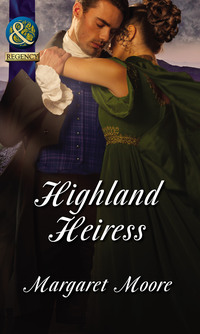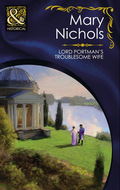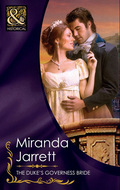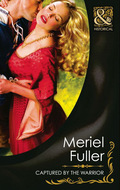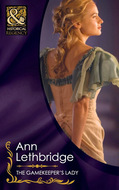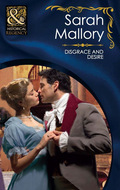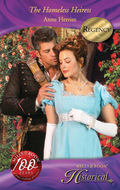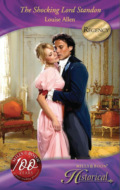Raamatut ei saa failina alla laadida, kuid seda saab lugeda meie rakenduses või veebis.
Loe raamatut: «Highland Heiress»
It felt wonderful, as if somehow this woman was meant to be in his arms.
Which had to be the greatest flight of fancy his logical, lawyerly mind had ever taken.
‘There you are, safe as houses,’ he said with a smile, trying to sound as if he did this sort of thing every day.
‘Thank you for rescuing me. I don’t know what I would have done if you hadn’t, Mr …?’
‘McHeath. Gordon McHeath. Of Edinburgh.’
‘I am in your debt, Mr Gordon McHeath of Edinburgh.’
Never had he been happier to hear the word debt.
Then, without a word, without a hint of warning, before he could even realise what she was doing, this woman whose name he didn’t even know raised herself on her toes and kissed him.
Praise for USA TODAY bestselling author Margaret Moore:
‘The talented Moore has penned another exciting Regency.’
—RT Book Reviews on HIGHLAND ROGUE, LONDON MISS
‘The story is fresh, fun, fast-paced, engaging and passionate, with an added touch of adventure.’
—The Romance Readers Connection on THE NOTORIOUS KNIGHT
‘Readers continue to ask for “Moore”. Her latest book is a sparkling, dynamic tale of two lonely hearts who find each other despite their pasts and the evil forces surrounding them.’
—RT Book Reviews on HERS TO DESIRE
‘Colourful and compelling details of life in the Middle Ages abound.’
—Publishers Weekly on HERS TO COMMAND
‘A lively adventure with enough tension and romance to keep me turning pages.’
—International bestselling author Roberta Gellis on HERS TO COMMAND
‘This captivating adventure of thirteenth-century Scotland kept me enthralled from beginning to end. It’s a keeper!’
—Romance Junkies on BRIDE OF LOCHBARR
‘Margaret Moore is a master storyteller who has the uncanny ability to develop new twists on old themes.’
—Affaire de Coeur
‘When it comes to excellence in historical romance books, no one provides the audience with more than the award-winning Ms Moore.’
—Under the Covers
Highland Heiress
Margaret Moore
MILLS & BOON
Before you start reading, why not sign up?
Thank you for downloading this Mills & Boon book. If you want to hear about exclusive discounts, special offers and competitions, sign up to our email newsletter today!
Or simply visit
Mills & Boon emails are completely free to receive and you can unsubscribe at any time via the link in any email we send you.
USA TODAY bestselling author MARGARET MOORE has written over forty historical romance novels and novellas. She graduated with distinction from the University of Toronto, has served in the Royal Canadian Naval Reserve, and is a past president of the Toronto chapter of Romance Writers of America. For more information about Margaret, including a complete list of all her books, please visit her website at www.margaretmoore.com
Previous novels by the same author:
THE OVERLORD’S BRIDE
COMFORT AND JOY (in The Christmas Visit) BRIDE OF LOCHBARR LORD OF DUNKEATHE THE VAGABOND KNIGHT (in Yuletide Weddings) THE UNWILLING BRIDE THE DUKE’S DESIRE HERS TO COMMAND HERS TO DESIRE THE DUKE’S DILEMMA MY LORD’S DESIRE THE NOTORIOUS KNIGHT HIGHLAND ROGUE, LONDON MISS KNAVE’S HONOUR A LOVER’S KISS THE VISCOUNT’S KISS
And as a Mills & Boon® Historical Undone! eBook:
THE WELSH LORD’S MISTRESS
Did you know that some of the novels are also available as eBooks? Visit www.millsandboon.co.uk
With many thanks to my parents, my husband
and my children for all the support, wisdom
and laughs along the way.
Contents
Chapter One
Chapter Two
Chapter Three
Chapter Four
Chapter Five
Chapter Six
Chapter Seven
Chapter Eight
Chapter Nine
Chapter Ten
Chapter Eleven
Chapter Twelve
Chapter Thirteen
Chapter Fourteen
Chapter Fifteen
Chapter Sixteen
Chapter Seventeen
Chapter Eighteen
Chapter Nineteen
Chapter Twenty
Chapter Twenty-One
Chapter Twenty-Two
Chapter One
Scottish Highlands, 1817
He had been too long in the city, Gordon McHeath thought as he rode along the crest of a hill toward the village of Dunbrachie. He drew in a great, deep breath of the fresh air. After so many years in Edinburgh, he’d forgotten how clean and bracing the air of the Highlands could be. He’d become too used to the smoke and the smells, the noise and the crowds, of a bustling city. Here the silence was broken only by birdsong and the occasional bleating of sheep or lowing of cattle.
The north-facing slope on his left was covered with gorse and bracken, the one on his right with a wood of birch, alders and pine. The needles of the pine were deep green and their scent came to him on the breeze, making him think of Christmas and dark winter nights, although it was only September. The leaves of the other trees were already turning brown and gold, and he guessed the ground beneath would be muddy and damp and thick with mulch. Through the trees he spotted a fast-moving river rushing between rocky banks that probably teemed with salmon in the spring.
Unfortunately, he’d also forgotten how cold a Highland breeze could be, and those heavy, gray clouds in the distance were definitely moving closer. Unless he wanted to be caught in a downpour, he had to get his hired light brown nag moving faster than a walk.
As he went to nudge his horse into a trot, a dog’s furious barking broke the country quiet. It wasn’t the baying of a hunting hound—more like a watchdog sounding an alarm. A shepherd’s dog, perhaps, or a farm dog guarding a crofter’s hut.
Gordon rose in his stirrups and looked around. He could see no herd of sheep, no crofter’s hut or anything that might require a watchdog.
“Help! Help me!”
The woman’s plaintive cry from somewhere in the wood was barely audible over the barking and rushing water, yet there was no mistaking the words, or the desperation.
Punching his heels into the horse’s side, Gordon tried to make it leave the road and head toward the sound of the woman and the dog, to no avail, for the beast had the toughest mouth of any horse he’d ever ridden and refused to obey, as if it were more mule than horse.
With a muttered curse, Gordon dismounted, threw the reins over the branch of a nearby bush and began to make his way down the rocky, slippery slope between the trees as quickly as he could.
He tore the sleeve of his three-caped greatcoat on a holly bush. His riding boots were soon covered with mud that dirtied the hem of his coat. His hat got knocked off by a dangling branch he didn’t see until it was too late. Reaching down to pick up his hat, he slipped and landed hard and started to slide, until he managed to grab a tree limb.
The dog kept barking, and the woman called out for help again, closer this time, thank God, although he still couldn’t see her.
He scrambled to his feet and as he did, he caught sight of the largest, most vicious-looking black dog he’d ever seen at the base of a tall, slender, golden-leafed birch not far from the bank of the river. The dog of no breed Gordon could name was one of the ugliest he’d ever seen, with a huge head and jaw, wide-set eyes and small ears. It stood with legs planted aggressively, growling, a dribble of saliva dripping from its mouth.
Despite that, Gordon was fairly certain it wasn’t a mad dog. He’d seen a rabid dog once, frothing and wild-eyed, moving with an uneven sideways gait, and he would never forget it. Nevertheless, he would keep as far from the beast as he could.
“Are you hurt?” The woman’s voice came from the same direction as the dog, her accent telling Gordon she was no peasant or shepherdess.
“No,” he called back.
Who was she? Where was she? He couldn’t see anyone near the dog, or that tree, unless… As he came cautiously closer, he peered up into its branches.
There she was, her arms wrapped around the trunk, standing on a branch that, although she was slender, looked barely able to support her weight.
Despite the circumstance, he couldn’t help noticing that she was also exceptionally pretty, with fine features, large, dark eyes and dark curls that peeked out from beneath a daffodil-yellow riding bonnet. Her whole riding habit was that same color of velvet—hardly the outfit of a thief or vagabond.
“I’m all right. Are you injured?” he asked as he considered what to do about the situation, especially that threatening, growling dog.
He had a pistol in his indigo greatcoat, for no man traveled alone and unarmed in this part of the country if he could avoid it, but shooting the animal should be a last resort. It might, after all, only be doing what it was supposed to do, if the young woman had ventured onto private land, for instance.
So instead of taking out his pistol, he bent down and picked up a rock that fit comfortably in the palm of his hand. He’d been a fairly skilled cricket player in his school days, and he prayed his aim hadn’t deserted him as he threw the rock at the dog’s hindquarters.
It struck the animal hard enough to draw its attention; unfortunately, it didn’t run away.
He swiftly searched for another suitable missile that would be heavy enough to make the beast leave, but not to seriously hurt it. A solicitor, he could easily imagine an irate farmer bringing a lawsuit against him for killing his dog that had been dutifully protecting his property.
“This branch is creaking. It’s going to break!” the woman cried.
And that would be a long way for her to fall.
He grabbed a rock slightly larger than the last. It was covered with mud and slippery, but he managed to lob it at the dog before it slipped from his gloved hands. It sailed through the air, bits of dirt and debris flying off it before it landed squarely on the dog’s back.
Finally the dog fled, loping away through the trees toward the river, where they could hear it splashing.
“Oh, thank you!” the woman cried as Gordon hurried to the foot of the tree. “I was afraid I’d have to stay here all night!”
He could see her better now. She stood balanced on a branch that was only about three inches thick, her arms wrapped around the slim white trunk. In addition to her velvet riding habit, the young woman, who looked to be about twenty, wore tan kid leather gloves and boots. Her skin was fair and smooth, her lips rosy and bow-shaped, and her big coffee-brown eyes regarded him with admiration.
“I’m happy to be of assistance.”
“I was lucky you were riding by,” she said as she began to climb down with unexpected alacrity, “and equally fortunate I spent so much time climbing in my father’s warehouses when I was a girl, or I daresay my fate would be worse.”
Warehouses? Of course, her father must be rich. That would explain the velvet. He wondered if she had a mother, brothers, sisters or possibly a fortunate husband.
His curiosity on that point was momentarily suspended when the hem of her dress got caught on a smaller branch, revealing first her booted foot, then her shapely ankle, then her equally shapely, stocking-covered calf….
Good God, what was he doing? Or rather, not doing? “I beg your pardon. Your dress is caught.”
“Aye, so it is,” the fair unknown replied, tugging it free while a blush added more color to her smooth cheeks. “I had no trouble getting up in the tree when I was afraid that dog would hurt me, but getting down is a different matter.”
“Allow me to assist you,” he offered when she reached the lowest branch about three feet from the ground.
Although he wasn’t quite sure exactly what he was going to do, Gordon stripped off his muddy gloves and shoved them into his pocket before stepping forward.
Not that he should touch her. That wouldn’t be proper.
On the other hand, surely these were exceptional circumstances.
She spared him having to come up with a plan by putting her hands on his shoulders. He lifted his arms and grabbed her around the waist. Then she jumped.
Her action was so quick, so confident, he wasn’t quite prepared and nearly lost his balance. They both would have fallen to the ground if he hadn’t immediately put his arms around her.
He didn’t even know her name, yet holding her in his arms felt undeniably…right. No, better than just right.
It felt wonderful, as if somehow, this woman was meant to be in his arms.
Which had to be the greatest flight of fancy his logical lawyerly mind had ever taken.
Worse, he was blushing like a schoolboy, although he was nearly twenty-nine. Nor was this the first time he’d ever held a woman in his arms.
“There you are, safe as houses,” he said with a smile, trying to sound as if he did this sort of thing every day.
“Thank you for rescuing me. I don’t know what I would have done if you hadn’t, Mr…?”
“McHeath. Gordon McHeath, of Edinburgh.”
“I am in your debt, Mr. Gordon McHeath of Edinburgh.”
Never had he been happier to hear the word debt.
Then, without a word, without a hint of warning, before he could even realize what she was doing, this woman whose name he didn’t even know raised herself on her toes and kissed him.
Her lips were soft, her body lithe and shapely, and her touch sent a rush of fire flashing through his body.
Without thought, acting only on instinct and need, he put his arms around her and pulled her closer. His heartbeat thundered in his ears as he slid his mouth over hers, gliding and grazing, until he coaxed her to let his tongue slip into the moist warmth of her willing mouth. His hands slowly explored the contours of her arching back, caressing her supple spine, her breasts pressed against his rapidly rising and falling chest.
Her hands moved upward, cupping his shoulders from behind, her body relaxing against his.
God help him, he had never been kissed like this. He had never kissed like this. He didn’t want to stop kissing like this….
Until he remembered that he was no Lothario, but an Edinburgh solicitor, and she must be from a well-to-do family, perhaps with a father or brothers, or even a husband.
At nearly the same time, she drew back as suddenly as if a wedge had been driven between them. She flushed as red as a soldier’s coat and swallowed hard, while he wondered what on earth he should say.
She spoke first. “I’m…I’m sorry, Mr. McHeath,” she said, her voice as flustered as her expression. “I don’t know what came over me. I’m not usually so… That is, I hope you don’t think I often kiss strange men.”
He wasn’t a strange man, but he knew what she meant. “I don’t usually kiss women I haven’t been introduced to,” he replied.
She moved back even more and ran her gloved hand over her forehead. “It must have been the strain. Or the relief. And gratitude, of course.”
Those could be explanations for her actions; what was his excuse for returning her kiss with such fervor?
Loneliness. A heart recently broken, or wounded at least. Her beauty. The feel of a woman’s arms around him, although they weren’t Catriona McNare’s.
Indeed, this bold young woman wasn’t at all like the meek and mild Catriona McNare.
“May I ask where you’re staying, Mr. McHeath? I’m sure my father will want to meet you, and an invitation to dinner is surely the very least we can do to express our appreciation for your timely assistance.”
She spoke of a father, not a husband.
Thank God. “I’m staying at McStuart House.”
Her whole manner and attitude altered as if he’d announced he was an inmate of the Edinburgh gaol. Her body stiffened and her luscious lips curled with disdain.
“Are you a friend of Sir Robert McStuart’s?” she demanded, her voice as cold as her kiss had been passionate.
“Aye. We went to school together.”
Her face reddened not with embarrassment but with obvious rage. What the devil could Robbie have done to make her so angry?
Since it was Robbie, he could think of several things, not the least of which was seduction—and as he knew from legal experience, hell really had no fury like a woman scorned.
“Did he tell you about me?” she demanded, her arms at her sides, her hands curled into fists. “Is that why you thought you could kiss me like that?”
“Sir Robert didn’t mention any young women when he invited me here,” he answered honestly, trying to remain calm in spite of her verbal attack. “I must also point out that I still don’t even know your name, and,” he added, “you kissed me.”
Undaunted by his response, she raised her chin and spoke as if she were the queen. “Thank you for your help today, Mr. McHeath, but any friend of Robbie McStuart is no friend of mine!”
“Obviously,” he muttered as she turned on her heel and marched away.
The moment Moira MacMurdaugh was out of Gordon McHeath’s sight, she gathered up her skirts and ran all the way home.
How could she have been so foolish? And impetuous? And bold? She never should have kissed him. Never should have touched him. She should simply have thanked him and let him go on his way.
When he pulled her closer, she should have broken away at once…even if Gordon McHeath’s kiss was like something from a French novel, full of heat and desire and need and yearning.
Worse, she could only imagine what Robbie Mc Stuart would make of this encounter, for surely Gordon Mc Heath would tell him. Soon more gossip about her would spread through Dunbrachie—and this time, it would be all her fault.
As if that weren’t bad enough, it was even more distressing to imagine her father’s possible reaction when he found out what she’d done.
He’d kept his pledge to her for nearly six months now—the longest span yet—and it sickened her to think her thoughtless act might cause him to start drinking to excess again.
Perhaps Mr. McHeath wouldn’t tell Robbie. After all, he was just as guilty of an improper embrace as she.
“My lady, ye’re back! Did ye fall? Are ye hurt?” the gray-haired, stocky head groom cried.
Jem hurried toward her from the entrance to the stables as she entered the yard bordered by a tall stone wall that had once surrounded a castle during the time of Edward Longshanks and William Wallace.
“Yes, I fell, but I’m not hurt. Did Dougal come home?” she asked, speaking of her horse.
“Aye, he’s here, the rascal,” Jem replied. “We were about to start a search for ye. Your father’s going to be that relieved when he sees you.”
Cursing herself again for lingering with the handsome Mr. McHeath, even if he was a tall, tawny-haired, strong-jawed, brown-eyed young man who looked like one of those Greek statues she’d seen in London, she hoped she wasn’t already too late…until she remembered all the wine and spirits were locked away and she had the only key. It wasn’t like Glasgow, where her father had only to go down the street to a tavern.
Nevertheless, she walked quickly through the new part of the manor that had been built by the previous earl, past the kitchen and buttery, the laundry and the servants’ dining room.
The delightful, homey smells of fresh bread and roasted beef filled her nostrils, and she felt a pang of nostalgia for the old days, before her father had started to drink heavily and before he’d come into his title and inheritance.
She reached the main floor of the house and the corridor leading to the library, her father’s study and the drawing room. The drawing room was part of the new building; the entrance hall with its dark oak panelling, the study and the library were not. Other rooms had been added in the times between the construction of the castle and the renovation and additions to the manor, so that now the country seat of the Earl of Dunbrachie was an amalgam of every architectural style from the Middle Ages to the Georgian period. She’d spent many hours when they first arrived here exploring all the nooks and crannies, cellars and attics, discovering forgotten pictures and furniture, dust, cobwebs and the occasional dead mouse.
Pausing for a moment to check her reflection in one of the pier glasses that were intended to brighten the otherwise very dark hall, and taking some deep breaths to calm her nerves, Moira removed her bonnet and laid it on the marble-topped side table beneath the mirror, then patted down the smooth crown of her hair.
“Moira!”
She turned to find her father in the door of his study. He was obviously agitated and his dishevelled thick gray hair indicated that he’d run his hands through it repeatedly.
“What happened? Are you hurt?” he asked as she approached. He took hold of her hands as he studied her face and clothes.
She decided the least said about what had happened that day, the better. “I’m quite all right. I took a tumble and Dougal ran off, so I had to walk back.”
“I was about to go after you myself.”
That explained his riding clothes—which he rarely wore, because he was no horseman, having spent most of his life in offices, mills and warehouses. Thank heavens she’d arrived before he’d gotten on a horse.
“I’m fine, Papa, really,” she replied, taking his arm and steering him into his study, which was the one room in the vast hall that seemed most like their old home in Glasgow.
As always, her father’s massive mahogany desk was littered with various papers, contracts, ledgers, quills, ink bottles and account books, for although he’d inherited a title and estate, he continued to oversee his business interests back in Glasgow. It looked a mess, but no one was allowed to tidy it, or else, her father claimed, he could never find anything. Older ledgers and account books were on the shelves behind his desk and a threadbare chair stood behind it. She’d been trying to persuade him to recover the chair for years, but he refused that, too, saying it was comfortable just the way it was. The only ornamentation in the room was a bust of Shakespeare sitting on the dark marble mantel that had belonged to one of the other earls.
“I don’t think you should be riding alone all over the countryside. What if you’d broken a limb?” her father asked as she sat on the slightly less worn sofa and he leaned back against his desk, wrinkling a paper that was half off the edge.
“I’ll be more careful next time. I promise.”
“Perhaps you should have a calmer mount—a nice, gentle mare wouldn’t be likely to throw you.”
Or gallop very fast, either. “Perhaps,” she prevaricated, not wanting to upset him more by protesting directly.
“And in future, you must take a groom with you.”
Her heart sank as she laced her fingers in her lap. She enjoyed having some time alone, away from the constant presence of all the servants. She supposed wealthy people who’d grown up in such circumstances were used to it; she, as yet, was not.
“You really must start acting more like a lady, Moira.”
“I’ll try,” she said. “There’s just so much to remember.”
And so many restrictions.
“With rank comes both privileges and duty,” her father reminded her.
Moira was well aware of that. Fortunately, not everything some would consider a duty was onerous to her.
“The school building is coming along nicely, Papa. You should come and see. And I’ve sent out the advertisement for a teacher,” she said, turning the subject away from her fall and its aftermath, and especially Gordon McHeath, silently vowing to stay far away from handsome strangers even if they looked like a maiden’s dream, kissed like Casanova and came charging to the rescue like William Wallace attacking the English.
His expression pensive, her father walked round his desk and shuffled some papers before he spoke again. “You do realize, Moira,” he began without looking at her, “that not everyone in Dunbrachie is in favor of your charitable endeavor? Even parents whose children will benefit are afraid you’ll be filling their heads with visions of futures that can’t possibly come to pass.”
“That’s because they don’t yet appreciate the value of an education,” she staunchly replied. “I expected some opposition. There always is when something is new and different. But once they see the value of being able to read and write and the opportunities it will afford their children, surely their opposition will melt away.”
“I hope so,” her father replied, glancing up at her. “I truly hope so. I would never forgive myself if something happened to you.”
She knew how much her father loved her and wanted her to be safe and happy. A more selfish, ambitious man would never worry about her as he did, or try to keep his promise not to overimbibe, or come to her with such a stricken, sorrowful expression when he discovered the truth about the man she had agreed to marry, and the things he’d done. She didn’t doubt that it had been almost as upsetting for her father to learn the true nature of her fiancé and have to tell her about it as it had been for her to hear it.
She hurried to embrace him. “We’ll look after each other, Papa,” she said with fervent determination, “as we’ve always done, in good times and bad.”
So she said, although she just as fervently hoped the bad times were at an end.
Tasuta katkend on lõppenud.

